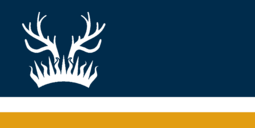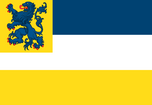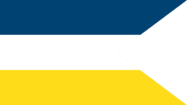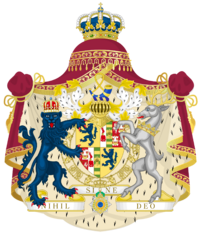Flag of Mascylla: Difference between revisions
| Line 113: | Line 113: | ||
| Example || || Flag of Kreshia || Example | | Example || || Flag of Kreshia || Example | ||
|- | |- | ||
| | | [[File:FlagKronlande.png|120px]] || 1798 on || Flag of the Kronlande || Two horizontal fields of green and yellow | ||
|- | |- | ||
| Example || || Flag of Langquaid || Example | | Example || || Flag of Langquaid || Example | ||
Revision as of 21:10, 14 March 2020
 | |
| Name | Reichsbanner und Reichshandelsbanner |
|---|---|
| Use | Civil and state flag, civil ensign |
| Proportion | 1:2 |
| Adopted | 1924 |
| Design | A horizontal tricolour of blue, white, and gold, and a depiction of the national crown with the antler of a deer in the canton |
 Variant flag of Mascylla | |
| Name | Kriegsbanner |
| Use | Ensign, war flag |
| Proportion | 1:2 |
| Adopted | 1931 |
| Design | A horizontal tricolour of blue, white, and gold, and a depiction of the nation's deer and bear in the canton |
 Variant flag of Mascylla | |
| Name | Dienstbanner der See- und Luftstreitkräfte der Reichswehr |
| Use | Naval ensign, naval jack, fin flash |
| Proportion | 1:2 |
| Adopted | 1924 |
| Design | A swallowtail of the ensign without the deer and bear in the canton |
The flag of Mascylla or Mascyllary flag (Hesurian: Maskillische Flagge) is a tricolour flag consisting of three unequally large horizontal bands displaying the national colours of Mascylla: blue, white, and gold (Hesurian: Blau-Weiß-Gold). The flag was first adopted as the national flag of modern Mascylla after the Mascyllary Revolution, though its main design has been largely attributed to the nation's earlier flag of the Mascyllary Kingdom, for a brief interruption in 1923.
While the meaning of the main colours of the flag are not exclusively explained in the any government document, a symbolism was slowly attributed to them. Blue stands for the long polar nights, which occasionally occur at areas that northernly, while they also depict the oceans and rivers. White stands for the purity of the monarchy, the people, and the state, while also symbolizing the snow of winter. And finally gold, which depict the colour of the crown and the main colour of the House of Ahnern, which currently rules Mascylla through its sovereign Dorothea I. Another version, which has been widely accepted, is that the blue stands for the Elbgau Confederation, which victoriously fought of Adwhin in the War of the Five Kings to unite Mascylla, hence the smaller and lower stripes of gold and white. However, historians agree upon that King Lukas I personally drafted the earliest version of the flag in the final peace negotiations in Langquaid in 1793. It has since been used as the Mascyllary flag, with a brief interruption of a horizontal tricolour of the same colours for the provisional May Republic.
Design
At the time of the adoption of the flag there were no exact colour specifications other than "the colours of blue, white, and gold". However on 11 May 1973, the High Cout of the Realm introduced a corporate design for the government of Mascylla which defined the specifications of the official colors as:
| Colour scheme | Blue | White | Gold | |||
|---|---|---|---|---|---|---|
| RAL | 5026 Denim blue |
9010 White |
1004 Golden yellow | |||
| HKS | 2.3G 2.9/1.8 | 1, 1, 1 | 1.5Y 2.9/1.1 | |||
| CMYK | 50.0.2.73 | 0.0.0.0 | 0.0.90.14 | |||
| Pantone | 1432 | White | 5442* | |||
| Web color | #131E3A | #FFFFFF | #E29D12 | |||
| Decimal RGB | 16,21,298 | 0,0,0 | 11,182,63 | |||
National flags
Mascylla
| Flag | Date | Use | Description |
|---|---|---|---|
 |
1924 on | The Mascyllary Flag, national flag of Mascylla | A horizontal tricolour of blue, white, and gold, and a depiction of the national crown with the antler of a deer in the canton |
Subnational flags
| Flag | Date | Use | Description |
|---|---|---|---|
 |
1793 on | Flag of Adwhin | Horizontal tricolour of red, green and white (from top to bottom) |
 |
1793 on | Flag of Aldia | Two horizontal fields of blue and yellow |
 |
1917 on | Flag of Elpsland | Two horizontal fields of white and red, the coat of arms of Elpsland in the center |
 |
1967 on | Flag of Eustria | Horizontal tricolour of red, yellow and blue (from top to bottom), the coat of arms of Eustria in the center |
| Example | Flag of Falia | Example | |
| Example | Flag of Flussmund | Example | |
| Example | Flag of Folnery | Example | |
| Example | Flag of Gotia | Example | |
| 1793 on | Flag of Halstein | Horizontal tricolour of blue, white and yellow (from top to bottom) | |
| Example | Flag of Holnia | Example | |
| Example | Flag of Ihlarn | Example | |
 |
1793 on | Flag of Jusland | Horizontal tricolour of blue, white and black (from top to bottom) |
| Example | Flag of Kreshia | Example | |
 |
1798 on | Flag of the Kronlande | Two horizontal fields of green and yellow |
| Example | Flag of Langquaid | Example | |
| Example | Flag of Laurenz | Example | |
| Example | Flag of Nelgery | Example | |
 |
1793 on | Flag of Pereuth | Vertical tricolour of blue, red and white (from left to right), the emblem of Pereuth juxtaposed between the blue and red field |
| 1827 on | Flag of Shwesia | Two horizontal fields of red and yellow | |
 |
1924 on | Flag of Sigismund | Two horizontal fields of yellow and blue, the coat of arms of Sigismund in the left half (central) of the flag |
 |
1801 on | Flag of Terunder-Welsbach | Horizontal tricolour of green, white and red (from top to bottom), the white stripe is divided into an upper white and a lower yellow field |
| File:Flag of Tudonia.png | 1950 on | Flag of Tudonia | Horizontal tricolour of red, white and blue (from top to bottom) |
